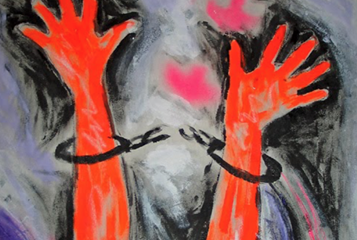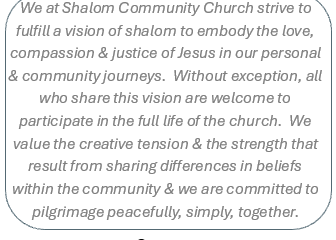Wrestling the Angel Thirteen Ways
21 So Jacob sent the gifts [to his brother Esau] ahead of him, but he spent that night in the camp. 22 Jacob got up during the night, took his two wives, his two women servants, and his eleven sons, and crossed the Jabbok River’s shallow water. 23 He took them and everything that belonged to him, and he helped them cross the river. 24 But Jacob stayed alone by himself, and a man wrestled with him until dawn broke. 25 When the man saw that he couldn’t defeat Jacob, he grabbed Jacob’s thigh and tore a muscle in Jacob’s thigh as he wrestled with him. 26 The man said, “Let me go because the dawn is breaking.”
But Jacob said, “I won’t let you go until you bless me.”
27 He said to Jacob, “What’s your name?” and he said, “Jacob.” 28 Then he said, “Your name won’t be Jacob any longer, but Israel, because you struggled with God and with men and won.”
29 Jacob also asked and said, “Tell me your name.”
But he said, “Why do you ask for my name?” and he blessed Jacob there. 30 Jacob named the place Peniel “because I’ve seen God face-to-face, and my life has been saved.” 31 The sun rose as Jacob passed Penuel, limping because of his thigh.\
Genesis 32:21-31
Wrestling the Angel as Just Another Day in the Fields[1]
Alone, having sent his wives and his children and all his belongings across Jabbok River, Jacob stands on the shoreline in the dark night and wrestles the angel.
This is not a wilderness experience. Jacob was a nomad herder who, to this point, had never settled down—there was no “wilderness experience,” there was just wilderness. Everywhere. He was always small and fragile and against the elements.
He knew predator and he knew prey and he knew how to defend his flocks. An angel is a lion and he had made a slingshot of his hands many times. Everything is sharp edged when you live in a wool house. So you grow knives and learn to wrestle and call it Tuesday. And call it a blessing.
Wrestling the Angel as Lent Discipline
So you gave up your chocolate, or meat, or social media. Or you gave up nothing. There is no right answer, the answer is that Lent is one of the holy seasons on the calendar, like the first half-week of January, when “the new me” is something you get to become. For 40 days, you are a changemaker. And when it is over, you are someone ever so slightly different, someone who did a hard thing when you didn’t have to.
And maybe this is just a way of making change feel like a choice. Maybe our choice to do something different during Lent is just a way of stretching our muscles for when the angel arrives and demands we wrestle.
Wrestling the Angel as Survival Reality Show
We entertain ourselves by watching people who do not know wilderness try to defeat wilderness. And this is a wrestling, a coming up against a stranger with violence, and this is entertainment. Watch a man kill a crocodile with just two rocks. Watch a man stumble through jungles and look for water from which he’ll get dysentery and he’ll be rushed to the offscreen doctors for recovery.
What we know about the Jabbok River is its shallowness. Imagine the wives, the sons, rustling from their camp beds and folding themselves into their separate brush piles on the other side of the river, watching their father make a fool of himself before God. Imagine them never having met their grandfather. Imagine them not knowing their grandfather’s name is Isaac, meaning laughter. Imagine they are laughing as God pulls their father’s leg.
Wrestling the Angel as Pacifist Paradox
What do we do with the violence of a torn leg? The masculinity-as-physical dominance? Can we explain away the pain, the deliberate hurt, God’s effort to injure and God’s unwillingness to injure? How Jacob can hold his opponent but not hurt him? Perhaps this is enlightened. Perhaps this is just a burning bush for the tactile child.
Perhaps we can explain this, blunt the edges of this violence, as we do the genocide and the death of Goliath and the death wishes of the Psalms. Perhaps we can ignore it, lay low the mountains of violence, as we do the genocide and the death of Goliath and the death wishes of the Psalms.
Perhaps we can wrestle it, as we do with all the paradoxes of our faith.
Wrestling the Angel as Reconciliation
Carrying demons is not the same as carrying baggage.
Jacob is on his way to reconciling with his brother, Esau, whom he nearly killed 600 sheep and a lifetime ago; who threatened to kill him. The brother from whom he stole the blessing of the firstborn; the brother who never made sense to him; the brother he could not respect and could not love and could not live with.
Jacob is a rich man now, a successful shepherd with sheep and camels and goats and servants to his name, and eleven sons to boot. His reconciliation is that of a sports hero returning home to start a school in his impoverished hometown. His reconciliation is the reconciliation of the powerful. He will see his brother, exchange words and gifts, and never seeing each other again, the better-looking and more athletic brother who believes he has atoned to the simpler and uglier brother he left behind. And he will go back to collecting rings and titles and records.
Sometimes reconciliation is the means, not the end. There are things we do to become the person we wish to become. This is not a glamourous motive. Or perhaps it is.
Wrestling the Angel as the Origin of Vampires
The man said, “Let me go because the dawn is breaking.”[2]
As if the darkness is more full of possibility and life and holiness than the daylight can ever hope to be.
Wrestling the Angel as the Five Stages of Grief
Elizabeth Keubler-Ross outlined the Five Stages of Grief as
- Denial
- Anger
- Bargaining
- Depression
- Acceptance
For a man who isn’t sure he deserves forgiveness, perhaps a fight clears the way for grace. wrestling a stronger man who refuses to kill him is the mercy he needs to believe reconciliation is possible.
Perhaps, for a man who is still a trickster and a thief, who will always be the brother who stole his brother’s shine, who will always be his father’s favorite and his mother’s thorn, wrestling an angel is just the thing.
On the shore of the Jabbock River, here is Jacob’s denial. Here is his anger. Here is the fight which ends with a bargain. And then Jacob crosses the river, limping, to his four wives and eleven boys, to continue on the road to meet his brother, whom he wronged. And he meets Esau. And he gives his brother goats. And he goes on his nomadic way with his sons, one of whom will be tormented by his brothers and sold into slavery in Egypt, whom he will not see until he is a very old man, and finally dies in foreign land. Where is the depression? Where is the acceptance?
What happens when we do not allow ourselves grief? Who would Jacob be if he had never allowed himself to stand on that river with his denial and hurt and bargains for the future he was so afraid to create?
Who will we become, if we do not allow ourselves to grieve? Let us have our denial. Let us have our anger, hot and inconvenient and at times embarrassing. Let us have our bargains. Let us stew in depression. Let us find acceptance, and then do it again, and again.
Wrestling the Angel as Beginning
Or maybe the grief starts after the adrenaline. Jacob turns back to the river, the shallow sunrise water stiffening the pain in his thigh, then numbing. And then the sun is up and his brother is moving across the desert toward him and the family must keep pack up and meet him halfway. And the children keep asking for things, and he is trying to listen through the pain, and maybe it was a mistake to think one can reconcile with one’s brother after so many years. Perhaps the expiration date passed and this is a fool’s errand and a fool’s blessing. Maybe all his blessings were for a fool.
Or maybe, when she wrote “Happiness,” Taylor Swift lifted her lyrics from Jacob’s throbbing thigh,
“In the disbelief, I can’t face reinvention
I haven’t met the new me yet.”[3]
Wrestling the Angel as Divine Joke
A man walks into a bar. Just kidding, the man is an angel.
God has a strange sense of humor. The angel is never called an angel. Jacob wrestles a man. Jacob demands a blessing from a man. Just as he demanded his brother’s blessing from his father. The man who started this mess is still the man who started this mess.
And the man replies, “Your name won’t be Jacob any longer, but Israel, because you struggled with God and with men and won.”
Which is it? Did Jacob wrestle an angel or did Jacob wrestle a man?
Jacob is now Israel. Is a renaming a blessing, if you do not get to choose your own name? Here is a joke, but where is the punchline?
Wrestling the Angel as Multiple Truths
Chantelle Todman, a fixture in Mennonite circles and a Black, afro-Carribean, afro-Latinx, contemplative queer woman based in Philadelphia, wrote a Menno Snapshot blog this week about leaving her leadership roles in Mennonite Church USA. She said, “If we take the time to slow down, sit with the grief of letting go of what has been, we can also discover the joy and beauty of what we built, what we learned, understanding about the reasons things ended, the pleasure of sharing moments of laughter and the collective awe of experiencing the Divine in our lives.”[4] It is always easier for the one who is leaving to say these things.
But maybe we only understand by grieving. Maybe grief is what leads us to the next right thing, the shuddering ugly-cry of honest, raging river loss.
It is true that Jacob wished to reconcile with his brother Esau. It is also true that it was a convenient time to leave the land of his bitter and manipulative father-in-law, Laban.
Chantelle Todman sits at the intersection of two patterns in Mennonite Church USA: women who have left their church leadership roles and Black, Indigenous, and People of Color who have left their leadership roles. But she is more than a pattern, she is an individual in her own context making her best decisions for her own reasons.
It is true that the women and BIPOC leaders have left across decades leave because the institutional church is a meatgrinder of an employer. And it is also true that the women and BIPOC leaders who left were following their own call.
It is a disservice to blame the institution for those who are courageous and creative enough to treasurer their own liberation over the long work of healing the institution. In leaving Shalom, I am choosing my own liberation over the long work of collective healing. There is a selfishness in that. And there is a circle in that, for liberation leads the individual back to the collective.
Back to Taylor Swift, who says,
“I can’t make it go away by making you a villain.”
Is the villain Laban, for wearing Jacob’s patience thin until he left? Is the villain Esau, for threatening to kill his brother? Is the villain Jacob, for his graceless inability to handle other humans kindly? To make a villain is to sacrifice one of the multiple truths at the altar of the easy narrative.
As Michelle told us last week, “In some genre fiction, one can write flat villains and get away with it—the reader accepts this treatment because the formula of the plot sometimes allows it. But writers cannot do this in literary fiction, and the reason they cannot do this is because it is not true. No one is wholly, flatly bad.” For all the harm the church has done—the big-c, denominational and ecumenical Church, and the little-c collection of communities we’ve floated in at different points in our lives—for all the harm the church has done, the church is never a flat villain.
Wrestling the Angel as Hospitality
Welcome the wrestle, the tumble, the physical movement of your skin against some angel’s unearthly flesh. Welcome the resistance and the challenge. Welcome the sharp edge of God changing who you will become. Wipe your feet on the mat and welcome ring as you enter it.
Hebrews 13:2 says, “ Be not forgetful to entertain strangers: for thereby some have entertained angels unawares.” Maybe it is a mistranslation.
Be not forgetful to wrestle with strangers, for thereby some have wrestled angels unawares.
Wrestling the Angel as an Act of Faith
In the moment, nothing came next: just the primal certainty to keep clinging to the ribcage he held.
We forget, with the perspective of 3,500 years, that we tell the story with the certainty of what came next: and then Jacob reconciled with his brother Esau; and then he settled with his family; and his oldest son slept with his youngest concubine; and his favorite wife—the one who tempered and tested him—died; and then his eleven sons sold his favorite most tender un-masculine rainbow-wearing, soft-handed boy, his favorite wife’s only son, to the slave runners and the coat of many colors was burned and as an old, sad man whose blessings had won him nothing but famine and angry children, he crossed out of the land he called home and stood begging before Egyptian royalty, who was actually the son who had not died, who stepped off the dais and walked to his father and wrapped his arms around him so hard he thought Joseph was trying to wrestle him.
But in this moment, in the darkness before dawn, none of that has happened. And as the angel held him by the throat and taunted him, that he would live to be an old and happy man, he could only take it on faith.
Wrestling the Angel as Unsatisfying Ending
And you fight with God, and you go on. And is that all there is?
“We’re all just who we are,” sings Joy Williams in her 2019 album Front Porch, and she is a Christian pop teen wonder who left the cut-throat world of Contemporary Christian Music to start the folk singer-songwriter duo The Civil Wars, then left the Civil Wars to release a solo album, where she says these words.[5] We’re all just who we are. We are all our own stories. Sometimes we are stories that don’t end up, that fit no conventions, we become strangers to ourselves, and we welcome these strangers, for in welcoming them, we may, for a moment, become angels unawares.
And then we go on.
[1] The format of this sermon is borrowed from Carmen Maria Machado’s memoir, In the Dream House.
[2] Gen. 32:26
[3] “Happiness,” Taylor Swift, Evermore, 2020.
[4] Chantelle Todman, “Endings and Beginnings.” I cannot speak for Chantelle Todman’s experience, and want to emphasize that the fact that her exit is a “pattern” does not necessarily mean that she chose to step back from her leadership roles for the same others did, or is indicative of a problem in any of these settings. At the same time, we can recognize patterns and the ways church institutions remain entrenched in white, heteronormative patriarchy and that white, heterosexual Christians can take an active role in creating more inclusive organizations. https://www.mennoniteusa.org/menno-snapshots/endings-and-beginnings/
[5] “Preacher’s Daughter,” Joy Williams, Front Porch, 2019.



0 Comments